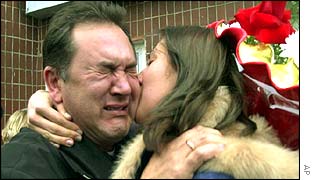| NEWS | SPORT | WEATHER | WORLD SERVICE | A-Z INDEX | ||||||||
|
| You are in: Europe | |||||||||||||||||||||||||||||||||||||||||||||||||||||||||||||||||||||||||||||||||||||||||||||||||||||||||||||||||||||||||||||||||||||||||||||||||||||||||||||||||||||||||||||||||||||||||||||||||||||||||||||||||||||||||||||||||||||||||||||||
|
Sunday, 27 October, 2002, 16:39 GMT
Gas 'killed Moscow hostages'

Relatives grieve as the death toll mounts
Almost all the 117 hostages who were killed when Russian troops stormed a Moscow theatre on Saturday died from gas poisoning, it has been admitted.
Only one of those held for three days by Chechen rebels died of gunshot wounds, said Andrei Seltsovsky, chairman of the health committee of the city of Moscow.
Up to 50 Chechen rebels were killed during the attack, but it remains unclear how many of them died from the effects of the gas, and how many were shot dead. Nearly 650 of the rescued hostages are still being treated for gas poisoning in hospital. Dr Seltsovsky told a news conference that 150 were in intensive care, and 45 remained in a critical condition. US demand One Russian expert said the gas used was a chemical weapons agent and blamed the high number of deaths on delays in administering the antidote.
"They would have been intended for a military opponent." As such, Mr Fyodorov said the authorities would be unable to prevent deaths of civilians in an enclosed space like the theatre. The Russian refusal to say which type of gas was used has irritated several western embassies in Russia. Terror link The United States has officially asked for more information, insisting it is crucial for the treatment of casualties. More claims have meanwhile emerged that international guerrillas had a hand in the hostage-taking. The Russian authorities in Chechnya have said that a substantial number of the female rebels were of Middle Eastern origin. This echoes President Vladimir Putin's recent suggestion that there were Arabs and Afghans among the hostage-takers. The Russian security service later said that it had intercepted intensive exchanges over mobile telephones between the hostage-takers and Saudi Arabia, the United Arab Emirates and Turkey. According to reports, Russian officials have instructed doctors not to let survivors out of hospital in case there are some hostage-takers hiding among the victims. Russian President Vladimir Putin made an emotional television address hours after the raid, in which more than 700 Russian and foreign hostages were freed. The president appealed for forgiveness for not having saved all the captives, but said the Russian forces had "achieved the near impossible, saving hundreds, hundreds of people". Mr Putin declared a day of national mourning on Monday for those who died in the siege. Mystery gas The special forces stormed the complex after pumping in the potent gas to disable the Chechen rebels.
Distraught families have been clamouring for information about relatives who are being held at medical facilities across Moscow, but so far they are not being allowed inside. Police believe some of the Chechen rebels might be posing as civilian victims and they want to screen all the patients. The Russian authorities often react with irritation to foreign - especially western - criticism of the war in Chechnya. And the information about the suspected origins of the hostage-takers is likely to boost their demand for understanding from the West, says our correspondent Steven Eke. But there are also serious questions to answer. about how the rebels managed to occupy the Moscow theatre. Russia's borders are not open. The country allows foreigners to enter only after they complete strict visa formalities. Foreigners living in Russia have to register with the police and may have their identity checked at any time. |
See also:
27 Oct 02 | Europe
27 Oct 02 | UK
26 Oct 02 | Europe
25 Oct 02 | Europe
26 Oct 02 | Europe
27 Oct 02 | UK
Internet links:
The BBC is not responsible for the content of external internet sites
Top Europe stories now:
Links to more Europe stories are at the foot of the page. |
|||||||||||||||||||||||||||||||||||||||||||||||||||||||||||||||||||||||||||||||||||||||||||||||||||||||||||||||||||||||||||||||||||||||||||||||||||||||||||||||||||||||||||||||||||||||||||||||||||||||||||||||||||||||||||||||||||||||||||||
Links to more Europe stories |
 |
||
| ---------------------------------------------------------------------------------- To BBC Sport>> | To BBC Weather>> | To BBC World Service>> ---------------------------------------------------------------------------------- © MMIII | News Sources | Privacy |